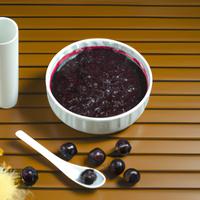
1 serving (100 grams) contains 70 calories, 1.0 grams of protein, 5.0 grams of fat, and 4.0 grams of carbohydrates.

Log this food in SnapCalorie

Nutrition Information
Calories |
166.7 | ||
|---|---|---|---|
% Daily Value* |
|||
| Total Fat | 11.9 g | 15% | |
| Saturated Fat | 3.6 g | 18% | |
| Polyunsaturated Fat | 0 g | ||
| Cholesterol | 0 mg | 0% | |
| Sodium | 16.7 mg | 0% | |
| Total Carbohydrates | 9.5 g | 3% | |
| Dietary Fiber | 4.8 g | 17% | |
| Sugars | 4.8 g | ||
| protein | 2.4 g | 4% | |
| Vitamin D | 0 mcg | 0% | |
| Calcium | 47.6 mg | 3% | |
| Iron | 1.4 mg | 7% | |
| Potassium | 309.5 mg | 6% | |
* Percent Daily Values are based on a 2,000 calorie diet. Your daily values may be higher or lower depending on your calorie needs.
Food Attributes
Source of Calories
About Organic acai berry
The Organic Acai Berry, a small, deep purple fruit native to the Amazon rainforest, is celebrated for its rich nutrient profile and unique flavor. Packed with antioxidants, particularly anthocyanins, it helps combat oxidative stress and supports overall cellular health. Acai berries are also a good source of healthy fats, fiber, and essential vitamins like Vitamin A and C, contributing to heart health, digestion, and immune function. Known for its subtly tangy, earthy taste, acai is a staple in Brazilian cuisine, often enjoyed in smoothie bowls or blended with other fruits. Low in sugar compared to many fruits, it’s considered a healthy addition to most diets. However, note that some processed acai products may include added sweeteners, so it's best to choose pure, organic forms to maximize its benefits. This superfood is both nutrient-dense and versatile, making it a popular choice for health-conscious eaters worldwide.



